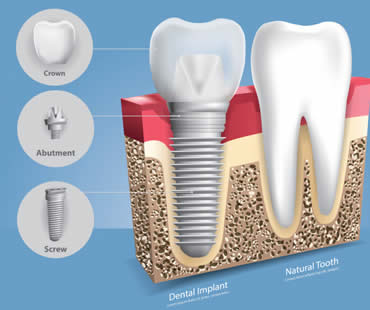Missing teeth can put a damper on your active lifestyle. You may feel self-conscious about your appearance, experience limitations in diet, or have difficulty speaking. Without a full set of teeth, you risk gum degeneration, bone loss, and other oral health problems. Designed to mimic the look and feel of natural teeth, dental implants can rejuvenate your smile.
What is a dental implant?
A small titanium post that serves as an artificial tooth root, a dental implant is surgically positioned into your gums. Your dentist will place a permanent crown on each implant, which completes the replacement tooth. Implants can be used for one or more missing teeth.
Am I a candidate for dental implants?
In general, anyone with a missing tooth should consider dental implants. The key to successful implant placement is good oral health and sufficient bone structure to support the posts. If you don’t have adequate bone levels, your dentist may recommend a bone graft to correct that situation.
How long does the procedure take?
Receiving dental implants is a two-step process. During the first visit, a trained specialist will surgically implant the posts into your jawbone. Then, you will need to wait three to six months for healing and integration with the jawbone. Once this occurs, your dentist will place the permanent crowns on the implants, giving you a full smile.
How do I care for my implants?
Just like your natural teeth, your implants require daily care. Brush often and floss frequently. Regular dental checkups are also important, so schedule visits at least twice a year.
If you need a dentist in Ottawa contact us today
Dental implants have become the standard of care recommended by dentists for replacing missing or damaged teeth. Compared to other solutions, many patients are finding that dental implants give them a reason to smile.
Realism:
Dental implants provide a new tooth and root that looks, fits, functions, and feel like a natural tooth. Implants avoid the potential problems associated with some alternatives, such as trouble eating, speaking or laughing.
Durability:
Dental implants can last a lifetime with proper care, making them outlast most of their counterparts which have a lifespan of up to 10 years.
Natural:
Patients are able to retain their natural face shape. Missing teeth can make a person’s face look sunken and saggy, but implants allow you to maintain your proper face shape and smile.
Protective:
Missing teeth may cause jaw bone deterioration or loss, but implants preserve and stimulate the natural bone. The jaw is able to maintain its strength and firmness, protecting your bone structure. Also, neighboring teeth are not affected by dental implants. Healthy adjacent teeth are not damaged and stay exactly where they should be.
Health:
Cavities can’t take hold in a dental implant and crown. Proper hygiene and regular checkups should continue to ensure your mouth is healthy, but that particular tooth will not decay.
Confidence:
Dental implants erase the patient’s embarrassment about their smile and give them the confidence to enjoy life again. No more worries about a big space in the smile, and no concerns that the restoration will loosen or fall out like may happen with dentures.
Convenience:
There are no hassles for the patient to alter their diet because implants allow natural biting and chewing. Favorite foods can still be enjoyed with this restoration.
We look forward to seeing you in our Ottawa dental office

More and more patients with missing teeth are taking advantage of the popular restoration method of dental implants. If you are considering implants, you might have some questions or concerns. It may sound like a daunting procedure that might scare you off, but getting the facts will likely ease your fears.
We offer Dental Implants in Ottawa
How will I know about the process?
Seeking treatment from a qualified, experienced, reputable dentist is the first step in the dental implant process. If you and your dentist decide together that implants are a good solution for you, dental X-rays will be taken to get a clear picture of your bite and exactly where the dental implant should be placed. With the appropriate data and information needed, your dentist will create a treatment plan for accurately inserting the implant during oral surgery and later placing a crown on top to complete the restoration. These initial steps in the process will help avoid complications during the implant procedure.
Does it hurt?
If pain is what’s making you hesitate about getting dental implants, the good news is that there is practically no pain during the procedure. You will remain comfortable during treatment thanks to simple anesthesia injections in the area. Although you may notice vibrations during implant placement, actual pain shouldn’t occur. Anti-anxiety medications are sometimes given to calm a patient’s nerves, and sedation dentistry is an option for those with more serious dental fears.
What about recovery?
Most patients experience minimal pain after dental implant surgery. Soreness is normal, similar to what you’d expect after getting a filling, but over-the-counter medication like ibuprofen is usually sufficient. Dentists sometimes prescribe an antibiotic or a mouth rinse to reduce infection risks during healing. With the advancements made in dentistry, there is no reason to shy away from dental implants. Make a dental appointment in our Ottawa office to learn more about them today.

Restoring a missing tooth is not as unnatural as you might think with the help of dental implants. These restorations have transformed the ability of dentists to make your smile complete and fully functional without the worries of cumbersome dentures or bridges.
Dental implants involve surgically placing a titanium rod into the jaw bone, which will then fuse with the bone to become a part of your body. A trusted, experienced dentist or oral surgeon is the best professional for this procedure. The implant provides a stable and secure base for a replacement tooth which is later placed on top of the rod.
Most people with missing teeth are candidates for dental implants, although your dentist will perform an examination to make sure. Healthy gums and ample strong bones are required for a successful dental implant treatment.
There are two main types of dental implants. Subperiosteal is designed for patients with a shallow jaw bone that does not allow for rebuilding, so these implants are placed under the gums. Endosteal is for patients with a thick jaw bone, which is ideal for the implant being placed into the jaw bone using plates, screws and cylinders for support. Your dentist will advise which type of implants are best for you.
Once the implant surgery is performed, the area will be allowed to heal for up to a couple of months so that the artificial tooth or crown placed on top will be able to successfully complete the procedure. Once the entire treatment is finished, you’ll have a fully functional, comfortable and secure new tooth and root.
No special maintenance is required with dental implants. Normal brushing and flossing is recommended, as well as regular dental checkups to guarantee good oral health. Implants are made to last a lifetime with proper oral care. With this advanced treatment that dentistry offers today, you can expect a worry-free restoration that gives you back your smile.
Our dental office is located in Ottawa
Dental implants can last a lifetime with proper care. Like natural teeth, dental implants require vigilant oral care to maintain their usefulness and prevent problems. Once the implant has fused to the jaw bone, it is important to follow some general guidelines to ensure the continued success of your dental implant and restoration.
A condition known as peri-implantitis is a common cause of implant failure. This occurs when an accumulation of plaque leads to damage of the tissues and infection of the bone around the implant. While the implant itself is not susceptible to decay, if plaque is not removed with thorough brushing and flossing at least twice per day the resulting periodontal disease can lead to implant failure.
Your dental professional may also recommend the use of additional oral hygiene products such as special brushes or oral irrigation devices to aid in the removal of food debris and plaque around the areas of the implant supported restorations. Your dentist or hygienist can assist in teaching you to utilize these devices to improve your implant care.
Regular dental visits and examinations are vital to detect and prevent any issues that may present problems for your dental implants. Expect to visit your dentist every 3 months for the first year after implant placement, and then every six months for the life of your implants. Your dentist will also provide special care instructions if your implants are being used to support a removable denture. It is important to know how to place and remove the appliance without causing damage to either the denture or your implant.
Avoid applying excessive pressure or eating hard foods that could cause damage to the restoration and implant area. If you suffer from conditions like teeth grinding or clenching, discuss with your dentist the option of being fitted for a night guard to prevent the problems these habits can cause your implants. Taking excellent care of your oral health will help to ensure years of dental implant success.
Our dental office is located in Ottawa
Dental implants are the best restorative choice for replacing a tooth that is missing. Whether the tooth has come out due to some kind of facial trauma or an infection or other issue, dental implants are the solution. The real difference in quality between a dental implant and other restorations such as bridges lies in the fact that the dental implant is placed directly into the patient’s jawbone, eventually fusing there through a process known as ossification.
Over time, ossification provides the kind of tooth base that is only seen elsewhere in natural teeth. When a dental implant is successful, it is as secure and as natural looking as a patient’s own original teeth; however, in some cases, dental implants fail. Sometimes they fail repeatedly. What’s causing these dental implant failures? Here are some potential causes.
Sometimes the implant doesn’t fuse with the bone and the bone shrinks away from the implant, leading to implant mobility or even the implant falling out. Patients who have weak bones due to age, osteoporosis, years of being edentulous (toothless) or another medical condition will find dental implants more challenging. If you’ve been having issues with failure to ossify, your dentist might recommend a bone graft to rebuild the jawbone to a healthy level so that dental implants can properly fuse.
In other cases, persistent infection may result in repeated implant failure. Signs of infection are continuous bleeding, swelling at the implant site or acute inflammation of the gum tissue at the implant site. Pus may be evident, or a bubble might appear on the gumline. Some health issues such as diabetes, auto-immune disorders or treatments like cancer therapies can weaken the immune system and leave the implant site vulnerable to infection. Your dentist might prescribe antibiotics or recommend you see an endodontist for a root canal treatment.
If you’re concerned about your dental implant, talk to Ottawa dentist Dr. Dzajkovski right away. Find out what steps you need to take to ensure that your dental implants are successful.
Schedule your appointment at our Ottawa dental office



